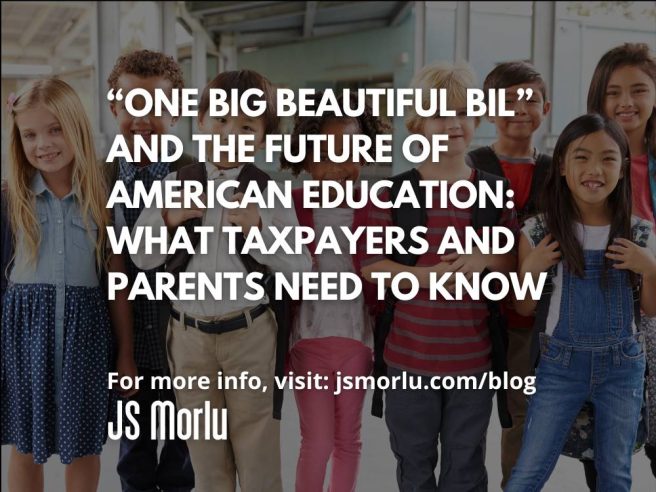On May 22, 2025, a narrow 215-214 vote in the U.S. House of Representatives pushed forward one of the most controversial pieces of legislation this year—the “One Big Beautiful Bill Act.” Spearheaded by former President Donald Trump’s political allies, this tax-and-spending package is already stirring debate across economic, political, and educational arenas.
As the bill heads to the Senate, the implications for taxpayers, high-net-worth individuals, and small businesses—especially those with school-age children—are worth unpacking. So let’s break it down the JS Morlu way: with clarity, confidence, and context.
The heart of this legislation lies in three broad categories:
1. Permanent Tax Cuts
The bill would solidify the tax cuts originally introduced during Trump’s first term. These cuts benefit individuals and businesses by reducing income tax rates and expanding deductions.
2. New Tax Breaks
Two new exemptions are on the table:
- Tip Income: For workers in service industries (think restaurants and salons), tips could become tax-exempt.
- Overtime Pay: Employees working beyond 40 hours could see those extra wages shielded from federal taxes.
For small businesses that employ hourly workers, this could influence payroll strategies and hiring plans.
3. Social Program Overhauls
Proposed changes include:
- Tighter work requirements for Medicaid and SNAP
- Elimination of clean energy tax credits
- Hefty funding boosts for defense and border security
These adjustments shift the federal budget’s focus and could have ripple effects for nonprofit organizations, home healthcare providers, and families relying on public assistance.
At the heart of the bill is a proposed $5 billion per year school voucher-style program. Here’s how it works:
- Taxpayers (individuals or businesses) donate to approved Scholarship Granting Organizations (SGOs)
- In return, they get a dollar-for-dollar federal tax credit
- SGOs provide families with scholarships covering:
- Private school tuition
- Textbooks
- Homeschooling costs
Think of this like turning your tax liability into direct support for a family’s education—potentially powerful, but controversial.
Why This Matters to You:
If you’re a high-net-worth individual, this could become a major tax-saving tool, especially if structured with appreciated assets like stocks. You could:
- Avoid capital gains tax
- Get a full federal tax credit
- Reduce your effective tax rate
Support and Pushback
Supporters say this is about freedom of choice. According to Senator Bill Cassidy (R-La.), it “makes the American Dream possible” by letting parents choose the best education for their kids. Proponents also argue that low-income families in failing school districts gain better options and the private sector steps in to improve educational outcomes.
Critics, however, argue this shifts public dollars to private hands. Sasha Pudelski from the School Superintendents Association warns of “rampant waste, fraud, and abuse” seen in other voucher programs.
Public school advocates worry that wealthy donors will exploit the tax credit as a tax shelter. They also argue that:
- Public school funding could shrink
- Inequity could widen
- 90% of U.S. students (those in public schools) may end up with fewer resources
Imagine a family—let’s call them the Parkers—living in a mid-sized Virginia suburb. Their public school has seen budget cuts for three years. Now, SGOs start offering scholarships in their district. Some classmates leave for private schools. What’s left?
- Larger class sizes
- Fewer programs
- Lower morale
That’s the concern voiced by the National Coalition for Public Education: instead of serving a few with vouchers, why not invest in making public schools better for everyone?
The bill now moves to the Senate, where it could be passed through budget reconciliation—meaning it doesn’t need bipartisan support. However, resistance from Democrats and education-focused groups suggests its path won’t be smooth.
If passed, the bill would dramatically alter the financial planning landscape for families, educators, nonprofits, and taxpayers.
What Should JS Morlu Clients Do?
If you’re a business owner, donor, or high-net-worth taxpayer, here are some action steps:
- Evaluate charitable giving strategies: If SGOs become a viable tax-saving vehicle, early adopters may gain the most.
- Review tax planning scenarios: Our proactive strategies can help you leverage new exemptions while avoiding audit triggers.
- Monitor the bill’s progress: JS Morlu will provide updates as the bill moves through the Senate.
Want a Personalized Tax Strategy?
This is where our expertise shines. Whether it’s charitable tax credits, multi-state tax planning, or strategic giving—we’ve helped clients navigate complex legislation to preserve and grow wealth.
📞 Contact JS Morlu today for a free consultation and stay ahead of what’s next in tax law.
JS Morlu LLC is a top-tier accounting firm based in Woodbridge, Virginia, with a team of highly experienced and qualified CPAs and business advisors. We are dedicated to providing comprehensive accounting, tax, and business advisory services to clients throughout the Washington, D.C. Metro Area and the surrounding regions. With over a decade of experience, we have cultivated a deep understanding of our clients’ needs and aspirations. We recognize that our clients seek more than just value-added accounting services; they seek a trusted partner who can guide them towards achieving their business goals and personal financial well-being.
Talk to us || What our clients says about us

